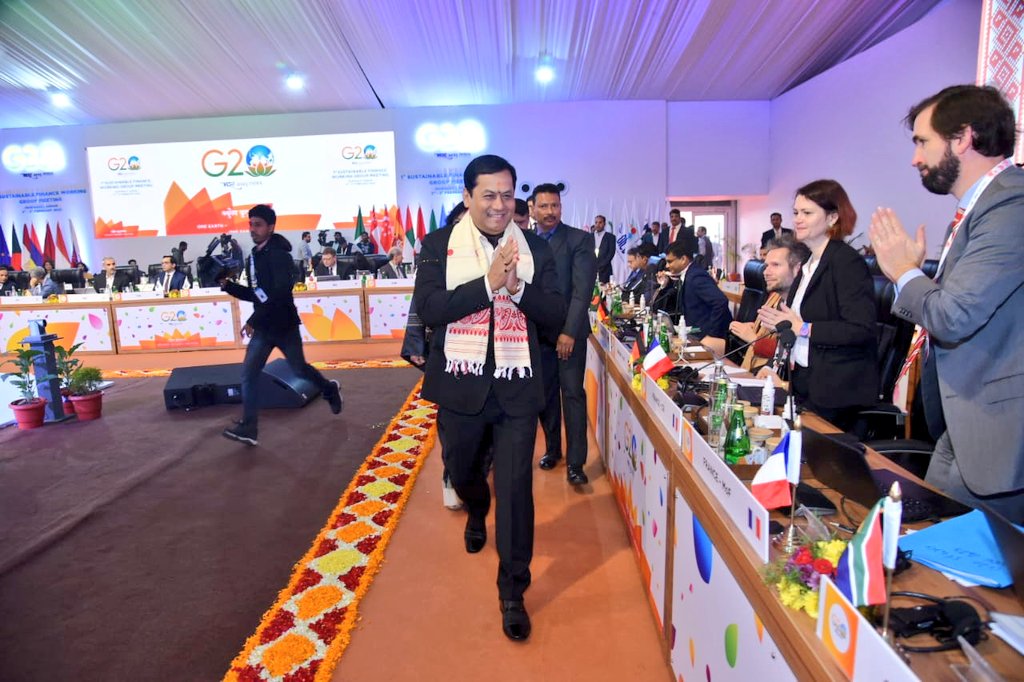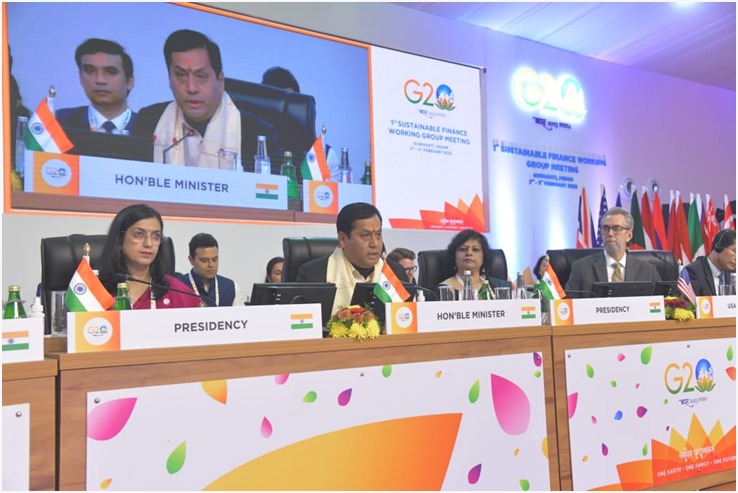
Guwahati: After two days of significant deliberations in Guwahati, the first meeting of the G-20 Sustainable Finance Working Group (SFWG) came to a successful conclusion.
95 representatives from G20 member nations, 10 invitees, and 14 international organizations, including the IMF, NGFS, World Bank, UNDP, UNEP Fi, ADB, NDB, and FSB, attended the first SFWG meeting. Additionally, a large number of additional international organizations from various countries took part in the meeting remotely.
Sarbananda Sonowal, the Union Minister for Ayush and Ports, Shipping, and Waterways, inaugurated the conference. The Minister emphasized Guwahati's numerous ethnic and cultural communities throughout his remarks. He claimed that Guwahati's approach toward protecting culture, history, and the environment is consistent with India's explanation of how traditional medicine contributes to a sustainable future.

"Our objective is to use and capitalize on India's old expertise and traditional knowledge to pave the road for a sustainable future," the minister said. In order to support a change toward greener, more resilient, and holistic communities and economies, the G20 SFWG seeks to raise sustainable financing. This will assist assure global prosperity and stability.
US Assistant Secretary of the Treasury Department Larry McDonald and Director General of the Research Bureau of the People's Bank of China Wang Jin attended the conference on behalf of the US and China, respectively, as Vice-Chairmen of the SFWG.
In Guwahati, the G20 Sustainable Finance Working Group (SFWG) prioritized the following three topics for discussion:
● Timely and adequate resource mobilization for climate finance
● Enabling finance for the Sustainable Development Goals
● Building ecosystem capacity to finance sustainable development.
The document prepared by the Government of India as a Presidency Input Paper for Priorities is also agreed to be a good basis for discussion. Also, the agreement on the issues that the public sector and MDBs will play an important role in raising finance at scale and at reasonable cost. All the workshops planned during the meeting, such as cooperation from early stage climate technologies to implementation and conferences on value-free policies, were discussed in detail.
All of the Member States present at the conference concurred that the discussion of priorities was timely and that each of the eight workshops scheduled as a complement to the sessions was worthwhile.

The working group's second priority was to prepare the finance for the Sustainable Development Goals. Due to the SDGs, which various nations are working toward, the domestic finance gap has grown recently. Delegates concluded that growing sustainable finance is essential to meet the challenges of a changing world because there are just seven years left to complete Agenda 2030. In 2023, the SFWG will provide an analytical framework for funding a subset of the SDGs in order to supplement the G20 Sustainable Finance Roadmap and offer stakeholders the essential guidance.
Additionally, as a byproduct, the SFWG will create a collection of best practice case studies on how the private sector, IOs, and rights sectors are funding the SDGs.
The topic of this program was thoroughly addressed, and member nations and international organizations provided appropriate support.
Due to the fact that many nations lack sufficient information, qualified experts, and a workforce in the field of sustainable finance, this third priority—building ecosystem capacity for sustainable development—has been selected.
When it comes to sustainable financing and reaching the Sustainable Development Goals, a skilled workforce is always a tremendous advantage. The SFWG will create a G20 Sustainable Finance Technical Assistance Action Plan in 2023 to address these issues (TAAP). This will involve identifying and analyzing current capacity-building initiatives as well as identifying skill shortages in sustainable finance. Using this information as a basis, the SFWG will offer suggestions to IOs, MDBs, international NGOs, and country departmental authorities on how to enhance capacity building services and consider how to create a worldwide network for sustainable finance capacity development.
Alongside the discussion, local product expo exhibiting Assam's rich culture and tradition was held to support the idea of locals having a voice. State cooperative societies, small and medium businesses, and other start-ups from around the state attended the event.
ALSO READ: APEDA’s Buyer-Seller Meet held to harness export opportunities in UAE for millets